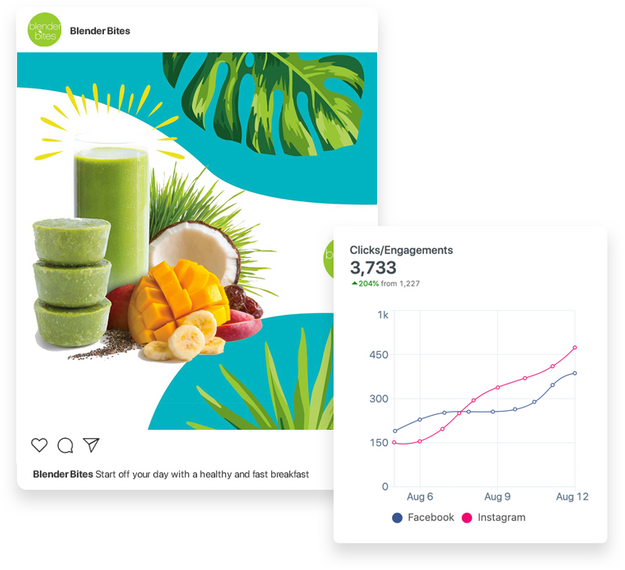E-commerce Social Media
#1 Marketing Platform® for E-Commerce
- Marketing
- SEO & Content
- Social Media
- Websites
- Platform
Build awareness with social marketing for e-commerce businesses
Get more customers by building trust and awareness with our social media marketing program for online stores — stand out online and earn more sales.
Why online stores need social media management
For an e-commerce business with lots of competition, the best marketing channels to focus on are the ones your prospective customers are spending the most time on. These days, that’s on social media.
The right e-commerce social media marketing strategy can help online stores improve brand awareness, expand their customer base, build trust with prospective customers, increase customer loyalty, drive sales and more.
Social media management for online stores involves creating and posting content, monitoring and responding to comments and messages, engaging with potential customers and establishing a consistent brand voice for your online store. It’s a lot of work, but well worth it.
We can help you master social media management
7 benefits of e-commerce social media marketing
1. Increase brand recognition
Brand recognition is a critical part of success for modern online stores. People who recognize your brand are more likely to trust and shop with you. One of the best ways to increase awareness for your online store is to create an active social media presence by posting regularly and engaging with users.
2. Build loyalty and connections
For an online store, almost nothing is more important than customer loyalty. Customers who are loyal to your brand are more likely than new customers to make large purchases when they shop with you online. Plus, they’re also more likely to tell others about your brand. Social media is tailor-made for building strong connections and customer loyalty.
3. Showcase your expertise
The internet gives shoppers access to more options than ever before, which means that modern consumers have many brands to choose from. By posting professional, educational content on social media that showcases your expertise, you can set your brand apart from your competitors and drive sales.
4. Humanize your online store
Humanizing your brand is a great way to make it stand out from your competitors in your customers’ minds. Highlighting your employees, sharing your story and giving your customers a behind-the-scenes look at your e-commerce business on social media is a wonderful way to humanize your online store.
5. Drive traffic to your e-commerce website
You can have the most beautiful e-commerce website ever built, but it will never drive sales and conversions for your business if no one ever visits it. When you include links to your online store in your social media profiles, posts and ads, you can drive traffic to your e-commerce website and turn social media users into visitors and customers.
6. Get to know your customer base
Having a good understanding of your customers is an essential part of effective e-commerce marketing. By posting surveys, questions and polls, social media gives online stores many different ways for you to get to know your customer base. This can help you figure out which channels to use, strategies to focus on and more.
7. Win customers and drive sales
Many online stores don’t think of social media marketing as a sales driver, but reality is that it’s essential in today’s market. From building brand awareness to increasing customer loyalty and showcasing your expertise, everything you do on social media can help you win new e-commerce customers and drive sales.
The best social media platforms for online stores
Facebook
Popular with people of all ages, Facebook is a fantastic social media marketing channel for online stores. Not only is Facebook a great platform for expanding your customer base, but it also offers many ways for online stores to provide customer service and connect with customers.
LinkedIn
LinkedIn is a popular social media platform for professional connections. For supplies, manufacturers and other B2B e-commerce businesses, there’s no other social media platform more valuable for B2B marketing than LinkedIn. You can also use LinkedIn to network with other businesses and build valuable business partnerships.
Instagram
Instagram is a visual social media platform that’s popular with younger audiences, making it great for e-commerce businesses that serve Millennials and Generation Z. By using the right hashtags on Instagram, you can expand your reach and get in front of more potential customers. Plus, you can make sales directly from Instagram.
YouTube
Not only is YouTube the most popular video streaming platform, but it’s also the second-largest search engine and a key social media platform for e-commerce businesses. Creating a YouTube channel for your online store and publishing videos on a regular basis can help you build trust and win new customers.
Pinterest
Many e-commerce businesses overlook Pinterest, but with the ability to showcase your products and make sales with buyable pins makes it a powerhouse for e-commerce marketing. With the right strategy, Pinterest marketing can help online stores increase visibility, build brand recognition and more.

How to make your online store's social media profiles stand out
Choose the right profile picture
When someone visits your social media profile, the first thing they see is your profile picture. It needs to be representative of your e-commerce business. That’s why it’s a good idea to choose your logo as your profile picture. Make sure that you closely follow recommendations for image dimensions.
Write an engaging bio
Your social media bio is your chance to give you social media users an introduction to your online store. Include a basic overview of your e-commerce business, including who you are, what you sell and what makes you different. If you can do so naturally, be sure to include relevant keywords to help you get found.
Ensure brand consistency
Regardless of whether someone finds your online store on Facebook, Instagram or Pinterest, people should be able to immediately tell that it’s your profile. That requires brand consistency across all of your social media profiles, including the colors, logos, typography and even tone of voice you use.
Use relevant keywords
People not only use social media to make personal connections, but they also use social media to find new products and brands. In order to ensure that you get found on social media, it’s important to use the right keywords and hashtags in your social media posts, as well as in your profile.
Establish a voice for your online store
Social media users need a reason to follow your online store, which means they need to know what to expect from the content you post. One great way to set the right expectations is to establish a consistent voice for your online store on social media. Plus, it also helps to guide your content marketing strategy on social media.
Post high-quality content
If the only thing you post on social media is discounts and other promotional content, it’s going to get boring for your followers quickly and they’re going to unfollow you. Instead, give people a reason to follow your online store by making it a point to post high-quality content that provides value to your followers.
Engage with your audience
Social media is a two-way street. In fact, that’s part of what makes it so valuable for online stores. By responding to comments and questions, sharing user-generated content and otherwise engaging with your audience, you can build strong relationships and customer loyalty on social media.
Use social media management software
A big part of implementing an effective social media marketing strategy for your online stores is staying active and posting on a regular basis. But, that can be easier said than done when you’re already a busy business owner. Luckily, e-commerce businesses can save time and stay consistent with social media management software, like the Marketing 360® Social app.

What to post on social media for e-commerce businesses
Online store updates
Have you recently hired a new member of your team, expanded your product line or been recognized with an award? Your social media followers want to know what’s going on with your online store. When you have updates about your online store, a great place to share them is on social media.
Educational content
Many online stores sell similar products — and at similar price points. If you want people to choose you, you need to figure out how to set yourself apart from your competition. One of the best ways to do that is by showcasing your experience and expertise by posting educational content on social media.
Promotions
These days, people are inundated with promotional content, and it can get boring for people pretty quickly. And, while it’s not a good idea to only post about discounts and other promotions on social media, your social media profiles are a great place to spread the word when you have an upcoming sale or special offer.
Product highlights and features
Even the best products won’t sell if no one knows that they exist. One of the best ways to highlight great products in your store is to post about them on social media. Showcase the features your products offer and how they can solve problems for your customers and add enjoyment to their lives.
Customer feedback and reviews
Shoppers have no shortage of options these days, which is why many people will read reviews when buying products online. That’s because people trust what other consumers have to say more readily than they trust what brands have to say. Harness the power of social proof and drive sales by posting your best customer feedback and product reviews on social media.
Relevant news stories
When something newsworthy happens that’s relevant to your industry, it’s a great opportunity to post about it on social media. This gives you a chance to share your professional opinion and educate your audience about recent news. It also helps you demonstrate your expertise and experience, and builds trust with e-commerce customers.
Industry memes and humor
If you can connect with your customers on an emotional level, they’re much more likely to remember your brand. Social media is the perfect platform for this. By sharing memes and other humorous content relevant to your industry on social media, you can make your followers laugh and your brand stand out.
We can help you create great social media content
Social media management FAQs for online stores
Why is social media management important for online stores?
Most online stores face a lot of competition. To survive in today’s market, online stores need to expand brand awareness by building a visible presence where their prospective customers are spending their time online. These days, that’s on social media platforms, like Facebook, Instagram and YouTube.
How do you create an effective e-commerce social media strategy?
There’s no such thing as a one-size-fits-all social media marketing strategy for online stores. However, there are a few things all effective e-commerce social media strategies have in common. These include posting regularly, responding to questions, comments and feedback, sharing user-generated content and monitoring your performance.
What are the rules online stores need to follow on social media?
When posting on social media for your online store, make sure that you always keep it professional, even if you're posting something humorous or informal. Avoid using profanity, making offensive comments or sharing confidential information about your customers. When in doubt, don’t post.
How often should an online store post on social media?
There are a number of factors that impact how often online stores should post on social media. These include the social media channels you’re using, who your target audience is and what your social media marketing goals are. However, all online stores could benefit from posting regularly — once a day or a few times per week.
Tour E-commerce Marketing
Get everything you need to manage and grow your business.
Plus, explore free account tools. No credit card required.




